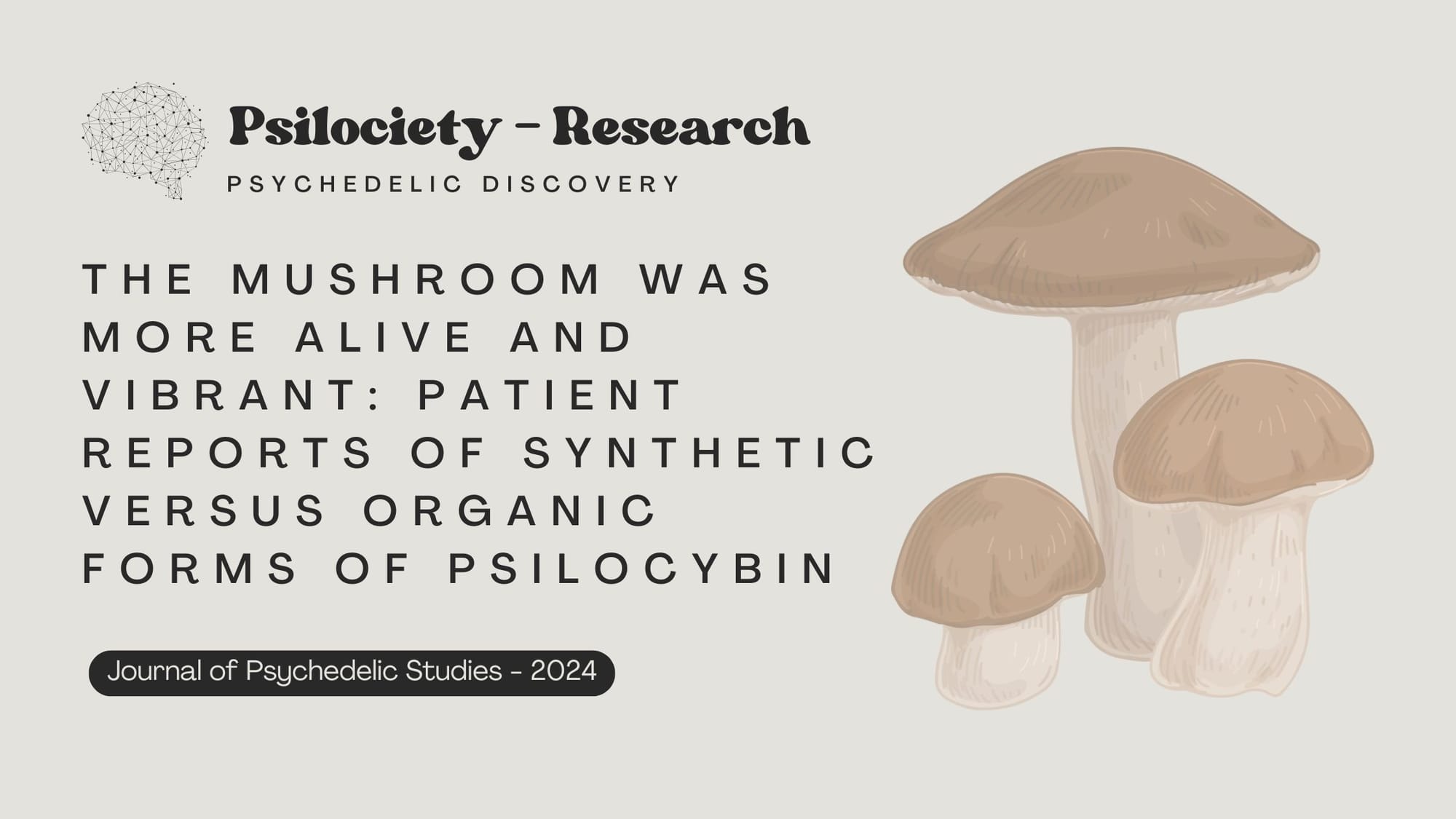The mushroom was more alive and vibrant: Patient reports of synthetic versus organic forms of psilocybin
This study aimed to explore the differences in patient-reported experiences when using synthetic psilocybin, whole Psilocybe cubensis mushrooms, and a mycological extract in a therapeutic context.

Title & Introduction
- Paper Title: "The mushroom was more alive and vibrant: Patient reports of synthetic versus organic forms of psilocybin"
- Published In: Journal of Psychedelic Studies, 2024
- Authors: Pamela Kryskow, Paul Stamets, Joseph La Torre, Katherine Sattler, Vivian WL Tsang, Monnica Williams
- Objective: This study aimed to explore the differences in patient-reported experiences when using synthetic psilocybin, whole Psilocybe cubensis mushrooms, and a mycological extract in a therapeutic context.
- Importance: The research investigates a significant gap in the field: how synthetic and organic forms of psilocybin differ in subjective experience and therapeutic outcomes, which could impact future clinical practices and accessibility.
Summary & Takeaways
- Key Takeaway: Organic forms of psilocybin offer unique spiritual and emotional benefits that synthetic psilocybin lacks, suggesting the need for broader research.
- Practical Application: The inclusion of whole mushrooms in clinical trials could better align therapeutic practices with patient preferences and traditional wisdom.
"The natural whole product is the mushroom, and for some reason, human beings have to manipulate that. Let’s just eat the mushrooms, the most natural way to go."
– Participant Quote
Key Background Information
- Context: While psychedelic-assisted therapy has largely focused on synthetic compounds, traditional Indigenous practices often use whole mushrooms. This study addresses the disparity in research focus by exploring whole Psilocybe mushrooms.
- Hypothesis: Synthetic and organic forms of psilocybin provide similar therapeutic benefits but differ in subjective experience and phenomenological depth.
Methodology
- Study Design: Qualitative study based on thematic content analysis of patient interviews.
- Participants: Four individuals aged 54-68, all white, participating in the Roots to Thrive Psychedelic Therapy program for end-of-life distress.
- Intervention: Participants experienced synthetic psilocybin (25 mg), whole mushrooms (2–7 g), and mycological extract (25 mg) in separate sessions.
- Controls: Not applicable due to qualitative design.
- Duration: Experiences were reported over a two-year period, with retrospective interviews conducted in summer 2023.
Key Findings
- Phenomenological Effects:
- Whole mushrooms: Described as vibrant, natural, and immersive.
- Synthetic psilocybin: Perceived as mechanical and less immersive.
- Preference: All participants preferred the whole mushroom experience, citing its natural and sacred qualities.
- Emotional & Psychological Effects:
- Participants reported heightened empathy and emotional breakthroughs across all forms but noted synthetic psilocybin elicited less euphoria and emotional intensity.
- Spiritual Experiences: Whole mushrooms were considered more spiritual and ceremonial, while synthetic psilocybin felt more clinical.
- Onset & Comedown: Organic forms had gentler transitions, while synthetic psilocybin had a sharper onset and faster comedown.
- Side Effects: Mild nausea and anxiety during onset were reported, particularly with mycological extract.
Interpretation & Implications
- Conclusion: All forms were therapeutic, but organic forms were preferred for their immersive, emotional, and spiritual qualities. This suggests a potential "entourage effect" from compounds in whole mushrooms.
- Implications: The findings advocate for more inclusive research on organic psilocybin to validate its therapeutic advantages and inform patient-centered choices.
- Limitations: Small, homogeneous sample size; variable doses of organic mushrooms; potential memory recall bias due to retrospective interviews.
Expert Opinions
- Expert Commentary: Further investigation into the entourage effect and traditional practices could enhance psychedelic-assisted therapy.
Researchers & Publication
- Authors: Pamela Kryskow, Paul Stamets, Joseph La Torre, Katherine Sattler, Vivian WL Tsang, Monnica Williams
- Published In: Journal of Psychedelic Studies, 2024
- Full Study URL: Link to Study

